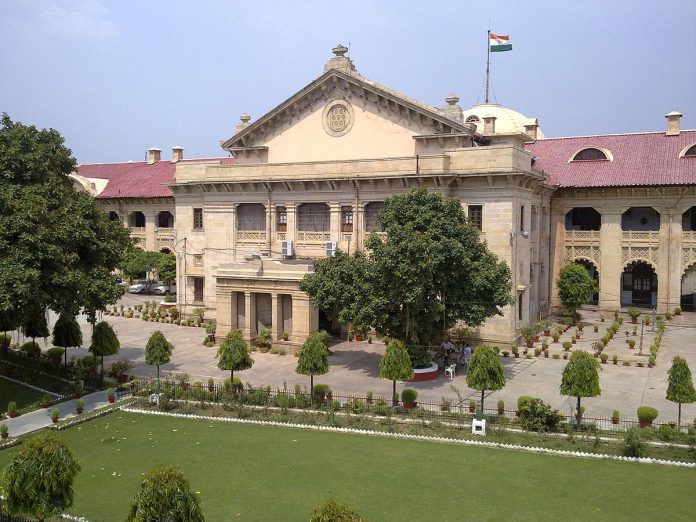The Allahabad High Court has given relief to the petitioner from Moradabad who was detained under the National Security Act.
The Division Bench of Justice Siddhartha Varma and Justice Ram Manohar Narayan Mishra heard the Habeas Corpus Petition filed by Kamalveer Singh.
The petition has been filed for the release of the petitioner – Kamalveer Singh, by issuing a writ of habeas corpus.
The facts of the case are that on 10.8.2023 an incident took place whereby one Anuj Chaudhary was killed and a First Information Report was lodged on the same day which gave rise to Case registered under Sections 302 and 307 IPC. There were four named accused in the case being Amit Kumar, Pushpendra, Aniket and Prabhakar and it was also alleged that there were some other persons who were not known to the First Informant. The First Information Report was lodged by one Sandeep Singh.
Thereafter on 01.11.2023 on the basis of an added Section, namely, section 120B IPC, the petitioner was also implicated in the Case in a conspiratorial role.
Further on 07.11.2023 in Case under Section 7/25 of the Arms Act, the petitioner was named in the crime. Still further, on 28.11.2023, the petitioner was implicated in Case under Section 3(1) of the U.P Gangsters and Anti-Social Activities (Prevention) Act, 1986. He was thereafter in jail.
Thereafter, on a report / proposal of the Police dated 30.11.2023, an order under Section 3(2) of the National Security Act, 1980, was passed wherein an order of detention was passed on 3.12.2023 by the District Magistrate for preventive detention of the petitioner.
The Court observed that,
From the arguments, which have been placed before us, we find that the grounds of detention were absolutely vague. No specific grounds had been taken as to how public order was being disturbed and only bald statements had been given out in the grounds of detention that when the incident had taken place, the locality had got disturbed. If the law as has been laid down by our Courts is perused, it becomes clear that a distinction has to be drawn between what is a law and order problem and what exactly is a disturbance of public order.
We are, therefore, of the view that the grounds taken in the “Grounds of Detention” which accompanied the detention order dated 03.12.2023 were absolutely vague and that there was no definite conclusion that maintenance of public order was being endangered.
Still further, we are of the view that when there was absolutely no chance of the petitioner being released on bail, the provisions of National Security Act, 1980 ought not to have been invoked. The petitioner was jailed on 01.11.2023 and the bail application was moved in Case only after the inclusion of Section 120-B of IPC.
The application was rejected on 17.11.2023 by the Sessions Court. There was, on that particular date, no further bail application pending with regard to the Case under the Arms Act and in the Case under the Gangsters Act.
We definitely find that after 10.08.2023, when the incident took place, there was some ruffle in the society but subsequently everything had quietened down. The order under the National Security Act for detaining the petitioner under preventive detention was passed 03.12.2023. By that time, definitely the upheaval in the society, if there was any, had quietened down and, therefore, a stale event ought not to, definitely, have been used for the purposes of the invocation of the National Security Act.
The Court also found that the representation which was sent by the petitioner on 13.12.2013 to the Union of India had for reasons best known to the Authorities concerned reached the Authority of the Central Government on 22.12.2023 and it was subsequently rejected thereafter on 23.12.2023 and the rejection order was communicated to the petitioner only as late as on 26.12.2023. In view of the decision of the Supreme Court in Rajammal vs. State of Tamil Nadu & Anr: (1999) 1 SCC 417 also the detention order therefore becomes bad in the eyes of law.
“Having considered all the arguments of the counsel for the parties, we are definitely of the view that the petitioner ought to be released after having found that the order dated 03.12.2023 could not be sustained in the eyes of law”, the Court further observed while allowing the petition.
Before parting with the case, the Court mentioned that the law of habeas corpus is dealt with in a most technical manner. The writ of habeas corpus could have been issued upon finding :-
(i) the authorities had invoked National Security Act despite the fact that there was no requirement of preventively detaining the detenue for the maintenance of public order;
(ii) there was no chance of the petitioner/detenue being released on bail in the cases in which he was punitively detained;
(iii) the petitioner was not given the assistance of lawyers/ amicus curiae when the State was given the assistance of law officers;
(iv) a stale event was taken into consideration for the invocation of the provisions of National Security Act; and (v) the Union of India had delayed the decision on the representation sent by the petitioner.
The Court reiterates that a finding on just any of the above issues in favour of the detenue would have resulted in the issuing of a writ of habeas corpus and thereafter the release of the detenue.
The order dated 03.12.2023 which was confirmed on 03.01.2024, for the reasons stated above is, therefore, set aside. The petitioner-Kamalveer Singh (detenue) be set at liberty unless he is required in any other case, the Court ordered


